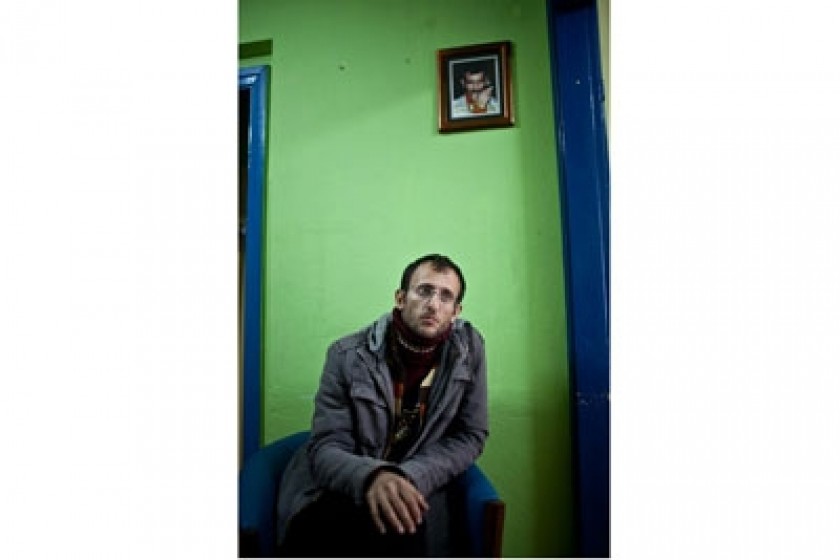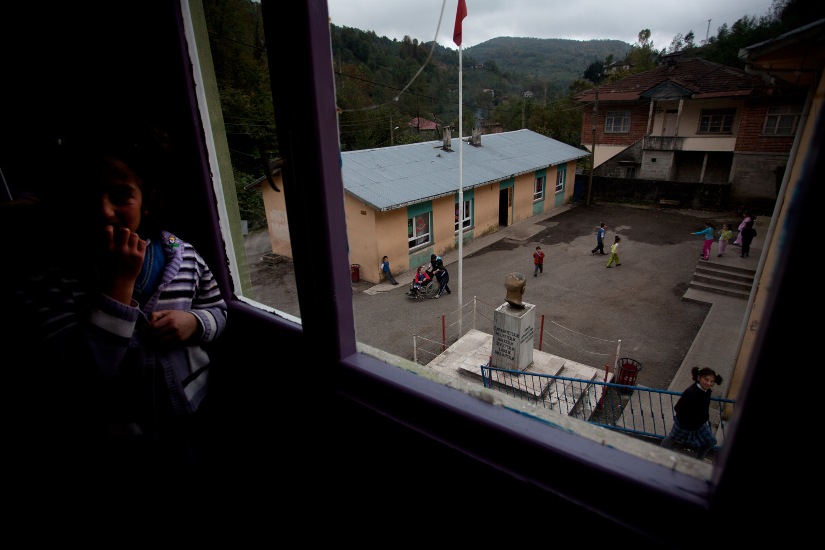
“Channel Two” Live From…
Cemil Aksu – Born in the Başoba (former Khigoba) village of Turkey’s Hopa region in 1977. Spent eight years in a Turkish prison for his political convictions. Editor of the Bir Yaşam magazine since its founding in 2008. President of the Bir Yaşam (One Life) Cultural and Environmental Organization. He is a freelance reporter whose articles have appeared in a number of Turkish newspapers and magazines.
Cemil has written this essay for Vahan Ishkhanyan’s “Armenian-speaking Muslim Hamshens” project.
In my view, the “history” of village children starts with school. It’s because a school is just that, a “school”. In other words, it’s a factory where even the “wild ones” are molded and civilized according to school standards. The school, the building’s color, the mandatory school uniform, discipline, rules…Like my peers, my “history” also began at school.
We were forced to learn a new language beginning from the first years of school…All the textbooks and classroom instruction were in that language. Teachers and elders would shower praise on those students who were able to speak that language well. Everyone was jealous – “Listen to how well he speaks, a real Stamboultsi,” they’d exclaim. For example, just imagine if you forgot how to say the word “toilet” and couldn’t express your physical need in that language and had to use the language you spoke at home with your mom…If that were the case you be reprimanded and, hiding your head in shame, you’d look to friends for consolation…Such things would happen to us often. We’d all break out laughing when one of our friends was singled out in such a way.
 |
| Başoba school, where Cemil studied |
I can never forget one time in the third grade. After gym class, the teacher asked me to go to the map room and bring back a havlu. I ran off, entered the room, and looked around in confusion. There was so much stuff. So which one is the havlu? - I asked myself. An upper classman came to my rescue. I told him that the teacher had sent me to get a havlu. “Which one is it?” I asked him. He went behind the door and took the peshkir (towel) hanging on a nail. It turns out that havlu is a peshkir.[1]
It seemed to me that those who spoke that language were beautiful, rich, smart and happy. In a word, they possessed all the correct attributes. That’s why I studied that language so enthusiastically in order to speak it well. However, it was best not to speak it all that much. Who wants to be ridiculed just for making one major mistake?
I remember another incident from those days. An older guy, I recall he was the village mayor, grabbed me by the shoulder and escorted me away from the school entrance. He started to ask me some questions – what’s my name, whose son are you, etc. “What’s your nationality, your citizenship?” he wanted to know. I had never been asked such things before. What’s the difference between citizenship and nationality, I thought, and why was the mayor asking me such a thing? I didn’t understand the question. They guy answered it for me – “You’re nationality is Hamshentsi and your citizenship, Turkish.”
I didn’t give what he said a second thought. Glad that the questioning was over, I ran off.
We knew that we were Hamshentsi and that residents of the other village were Laz. We’d make jokes about them - Laz, khelku bagas (Laz, empty-heads). However, we had never met a Laz face-to-face. The way we figured, anyone who didn’t speak our language was a Laz. They spoke Turkish quite well and regarded us to be uncouth, uneducated and uncivilized. Or at least that’s what we thought. When I entered high school, I rubbed shoulders with those fluent Turkish speaking, hamburger eating, cola drinking, basketball playing and pop music listening people. We were under the same roof. Before meeting them we’d deride them, those empty-headed Laz, but afterwards…
In the village where I grew up, we never discussed such concepts as being Laz or Hamshentsi. When we’d eavesdrop on the conversations of our “older brothers” we’d mostly hear the words - revolution, socialism, party, Marx, Lenin, etc. Our curiosity was peaked. At the first opportunity we’d sneak a peek at the magazines hidden under their beds and read the pages they had highlighted. We would read the graffiti on houses and the school walls, memorizing them by heart. “Revolution is the only path”, “Dev-Genç” (Revolutionary Youth), “Solidarity lives”…Our elders began every one of their mournful, brooding discussions with the words, “How we suffered in the 1980s…” and continued by complaining, “The youth of today are good for nothing.”
These were the words and conversations that would later influence the words and actions of the new generation coming of age. We had become activists and had dedicated ourselves to the struggle for revolution and socialism. In that struggle, there was no room for discrimination between Laz and Hamshen. “All oppressed nations were brothers” and the bourgeois class was our “enemy”. It was considered reactionary to harp on the Laz-Hamshen conflict, for such things only harmed the revolution.
All the while, it was considered a public disgrace to pass over to “Channel Two” - a codeword for speaking in another language other than Turkish. In school they kept drumming it into our heads – “speak Turkish at home as well”. Nevertheless, we kept getting low grades in Turkish class. When riding in a bus, passengers would stare at us if we spoke in “Channel Two”, as if to say, “Who are these ill-mannered bumpkins?”
Later on, something surprising happened…A Laz artist sang Hamshen songs on his CD, right in front of thousands of people. Everybody was listening and dancing to those songs. It was fantastic. People got all excited even if they didn’t understand the words. No one accused that Laz guy for singing “Channel Two” songs and no one complained that he was uncivilized.
Then something else occurred…Those people who mastered “Channel Two”, but couldn’t use it in all places, seemed to have been freed of a heavy burden. They began to sing “Channel Two” songs and dance their horon (circle dance). Later on, they began to understand the inner turmoil they felt as a consequence of being estranged from their native language. They began to ponder the issue. Yes, they took a step back and began to think about the emptiness in their souls, about the memory loss that had grown in them over time…
An individual’s personality more or less derives from the harmony between the identity he/she is born with and the one he/she chooses. Identities are the shelters that preserve the characteristics, memories and desires specific to humans. Over time, of course, we lose the need for certain shelters and no longer use them. This is a question of preference. However, when others, let’s say those in power, decide which shelter we should give up for us, it’s as if a person looses a piece of their body. We feel its absence like a lost limb. Sometimes we feel like the limb is still there, even if in a dream, but in reality it’s gone.
Not speaking in “Channel Two” for the past ten years, all this retreated into the depths of my consciousness…I finally understood that when you tell someone “seni seviyorum” (Turkish-I love you) and “kezi haz genim” (Hamshen-I love you), they are different things. Love, longing, friendship, union, destiny… I could express these sentiments in both languages, especially in Turkish. However, speaking in “Channel Two”, I could express them more succinctly… But by then, I couldn’t speak “Channel Two” that well…
 Videos
Videos Photos
Photos
Comments (2)
Write a comment